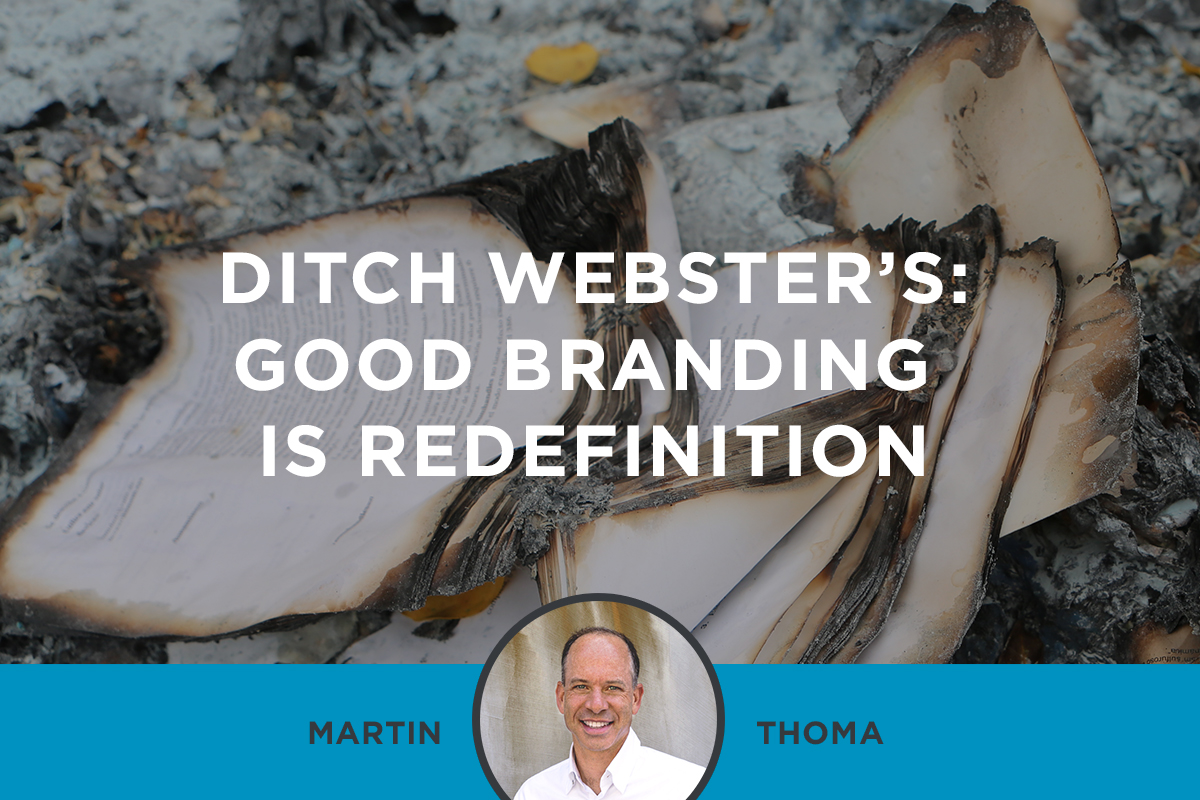What business are you in? Accounting, technology, insurance, banking, real estate, healthcare, consulting?
I encourage you to get out of it. Today.
Don’t change jobs. Don’t sell your business. Just redefine it. Get out of your generic category and get into a new, different space that you create and define.
This is a central discipline of branding. It is differentiation. And as author-guru Jack Troutt famously said, you must “Differentiate or Die.” Undifferentiated businesses, products and services are commodities. Commodity businesses are in a race to the bottom — the bottom of profitability, pricing power, talent recruitment and retention and market share. Who wants to finish there?
Tossing Webster’s and redefining your business can help you create a differentiated brand position — opening the door to the market leverage, pricing power and loyalty you know you need.
Disney World is a quintessential example. Sure, Disney World is an amusement park — with the rides, food, shows and all that. But the company very purposefully defines Disney World as something else — a theatrical production. The park is the stage, the employees are cast members, customers are guests, and every morning the curtain rises on a new show. The Disney cast is engaged in creating a magical experience for each guest. Cast members are carefully trained and rehearsed in their roles, every one of them is thoughtful and intentional about the customer experience he or she is creating. As with a theatrical play, all the mechanics and logistics of such a production are carefully hidden backstage so that the audience can be transported.
Redefining your businesses causes you to consider not just what you call things, but how you develop products, deliver service, hire staff and execute every day.
Southwest Airlines is a good example. It might have decided to define itself as a “low cost carrier.” That’s what the industry analysts now call the entire category of airlines that Southwest inspired. But no, Southwest defined itself as the democratizer of the skies — it would make air travel accessible to the average joe. It would disrupt the staid, elite culture of air travel and make a flight cost-competitive with a bus, train and car trip.
“Democratizing the skies” is not a business; it’s a mission. Anyone looking back on Southwest’s industry-disrupting track record can see that the company attacked its business with missionary zeal. There’s a great story about founding CEO Herb Kelleher declining the recommendation to replace peanuts with candy bars; customers were complaining about the meager rations. “Do you know how much a candy bar weighs? Do you know how much fuel it will cost to fly millions of candy bars around the country? Do you know what that will do to fares? No. Let them eat peanuts.” (I paraphrase.)
Those are big, well known companies, you might say. Highly effective, established brands with a great big head start on my firm, you might say. All true. But redefinition works well for smaller players already firmly established in their niches.
Our client HealthSCOPE Benefits is a great example. Purchased in a management buyout after years of being shopped from one owner to another — banks, insurance companies, etc. — the company needed to crystallize and clarify its brand position.
The company was successful; it noted it was the country’s fifth-largest third party administrator, behind only some of the “IBMs” of the insurance-services business. A third-party administrator manages claims and payments for someone else’s insurance plans — in this case self-insured plans of large employers.
Working through a brand strategy exercise with us, HealthSCOPE recognized that its uniqueness was rooted in data analysis and proactive employee health management. By actively managing its clients’ employee population health, it drove medical cost escalation down into the low single-digit percentage rates — a vast improvement over the double-digit rates generally experienced. Such a practice created healthier people, healthier businesses, healthier balance sheets. HealthSCOPE Benefits redefined itself as a “total health management company” delivering “healthy people, healthy business, healthy futures.”
Did it matter? The business hadn’t changed, only the definition. In its first major pitch following this reframing, HealthSCOPE won the largest ever account in its corporate history, besting several of the “big blues” of the insurance industry. Their new client told them, “we really like your philosophy, approach and track record. It aligns with our point of view and where we want to go in our business.” HealthSCOPE never again had to describe itself with the wretched category label: the country’s fifth largest third-party administrator — and it continues to leverage its unique definition to earn new client relationships.
An old saw in marketing and product development is “he who creates the category owns the category.” This is first mover status. Good examples include Apple in smartphones, Chrysler in minivans, Starbucks in boutique coffee and Microsoft in personal computer software. When you are the first in a new space, you claim most of the mindshare and suck up all the oxygen. You create high fortress walls against subsequent imitators and competitors.
If you’re creating an entirely new category, best of luck to you. Few businesses are so smart or so fortunate. For the rest of us, finding ways to redefine and slice out a unique and defensible “category definition” is a next best thing. And a great way to get traction in establishing your unique brand of business.
This article originally appeared in Talk Business.

